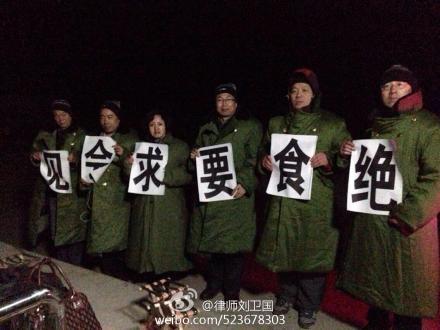Qinglongshan, Chinese for “Azure Dragon Mountain,” is an otherwise unremarkable farming project on the northeastern edge of China, just across the river from Siberian Russia.
It’s also home to a notorious “Legal Education Base,” a state facility commandeered for the forcible ideological remolding of practitioners of Falun Gong, a traditional meditation and spiritual practice that has been persecuted by the Communist Party since 1999.
For years, rights lawyers have defended practitioners, then themselves as the police harassed and pressured them to cease their work.
On Dec. 1, three lawyers working on the most well-known case of abuse at Qinglongshan were called in for questioning, part of an attempt by the Communist Party’s secret police force to ascertain their involvement in a petition against Jiang Zemin, the former head of the Communist Party who initiated the campaign against Falun Gong.
They had on Oct. 28 submitted a criminal complaint against local authorities, on behalf of their clients, to Heilongjiang’s prosecutors. But rather than look into the matter, prosecutors simply passed the documents on to the secret police force—the very agency that is being accused of running an illegal brainwashing center.
The secret police were particularly incensed by the fact that among the legal documents there was a petition, signed by 1,300 residents of the Jiansanjiang area in which Qinglongshan is located, in support of torture victims who are now suing Jiang Zemin.
“It seems that it made quite a big impact,” said Chang Boyang in an interview with Epoch Times, referring to the regime’s reaction.
The lawyers—Chang Boyang, Ren Quanniu, and Wang Lei, all in central China’s Henan Province—were contacted by their local judicial bureau at the behest of the 610 Office in the northern subzero province of Heilongjiang.
“Family members of the defendants have reported Jiang Zemin, and we filed a lawsuit against the judge for his failure to abide by the law,” Chang said. “We demand that the judge’s violations be investigated, as well as the illegal existence of the Qinglongshan brainwashing center.”
The 610 Office is the unofficial name of an extralegal Communist Party agency set up by Jiang Zemin to facilitate the persecution of Falun Gong. It has the Party’s authority to oversee police and courts at multiple administrative levels.
A ‘Special Task Force’
Regime authorities in Jiansanjiang responded to the letter and associated local petition by creating the “1028 Special Task Force” to harass rights lawyers involved in the case, believing them to be responsible for the upsurge in public interest, said lawyer Ren Quanniu, who got his information from inside sources.
The original package of documents that set off alarms inside the regime’s security organs were submitted on Oct. 28 by Han Sujuan, a Falun Gong practitioner who had been held at Qinglongshan. With the help of defense attorneys, she and others involved in the Jiansanjiang case delivered a joint letter of complaint from more than 50 victims and a disc of 14 other victims’ recorded speeches to the Heilongjiang Procuratorate.
Suits Against Former Leader
The support for the Falun Gong defendants appear to be part of a trend of Chinese signing petitions condemning the regime’s persecution across the country.
In Tangshan, a metropolis near Beijing, 27,000 people signed their names and gave their fingerprints in cinnabar ink (the traditional Chinese style of signature) to support the legal action against Jiang Zemin.
Since this May, when new legislation made it possible for ordinary Chinese to have their civil cases processed by courts and submitted to higher judicial authorities, over 200,000 people have filed suits against Jiang Zemin for his role as chief persecutor of Falun Gong.
It is not clear what inspired the May judicial reform, but in recent years, the communist regime has increasingly appealed to such slogans as “rule of law” to bolster its legitimacy in a society where Marxist ideology has diminishing currency.
Official reactions to the lawsuits have been mixed. While some law enforcement staff have processed the documents or even supported Falun Gong practitioners in their efforts, others have interfered with the process by harassing or detaining the plaintiffs.
Earlier this year, a petition condemning the practice of forced organ harvesting, in which Falun Gong practitioners and other prisoners are murdered for profit in state-run hospitals, garnered 50,000 signatures nationwide.
Legal Attrition at Jiansanjiang
The Qinglongshan brainwashing center dates back to 2010, when Chinese police established the “Heilongjiang Agricultural Bureau Legal Education Base” in the village environs. It serves as an unofficial “black jail” and brainwashing center, according to reports published by Minghui.org, a website run by Falun Gong practitioners to document the persecution.
Since China abolished the labor camp system in 2013, so-called “black jails” such as Qinglongshan have become the facility of choice for regime agencies involved in the repression of Falun Gong in recent years.
Practitioners held at Qinglongshan are beaten by police and hired thugs, confined in torturous conditions, and bombarded with anti-Falun Gong material in an attempt to force them to renounce their faith and pledge allegiance to the Communist Party.
This May, four practitioners still jailed at Qinglongshan—Li Guifang, Shi Mengwen, Wang Yanxin, and Meng Fanli—were illegally sentenced to prison terms ranging from two to three years each. Heavily-armed police deployed at various checkpoints prevented the lawyers from ever reaching the court.
Jenny Li contributed to this report.




